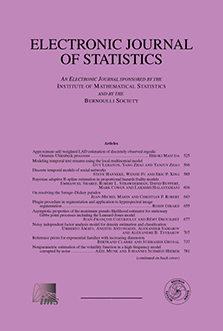Abstract
In this paper, we consider the estimation of a change-point for possibly high-dimensional data in a Gaussian model, using a maximum likelihood method. We are interested in how dimension reduction can affect the performance of the method. We provide an estimator of the change-point that has a minimax rate of convergence, up to a logarithmic factor. The minimax rate is in fact composed of a fast rate —dimension-invariant— and a slow rate —increasing with the dimension. Moreover, it is proved that considering the case of sparse data, with a Sobolev regularity, there is a bound on the separation of the regimes above which there exists an optimal choice of dimension reduction, leading to the fast rate of estimation. We propose an adaptive dimension reduction procedure based on Lepski’s method and show that the resulting estimator attains the fast rate of convergence. Our results are then illustrated by a simulation study. In particular, practical strategies are suggested to perform dimension reduction.
Citation
Aurélie Fischer. Dominique Picard. "On change-point estimation under Sobolev sparsity." Electron. J. Statist. 14 (1) 1648 - 1689, 2020. https://doi.org/10.1214/20-EJS1692
Information





